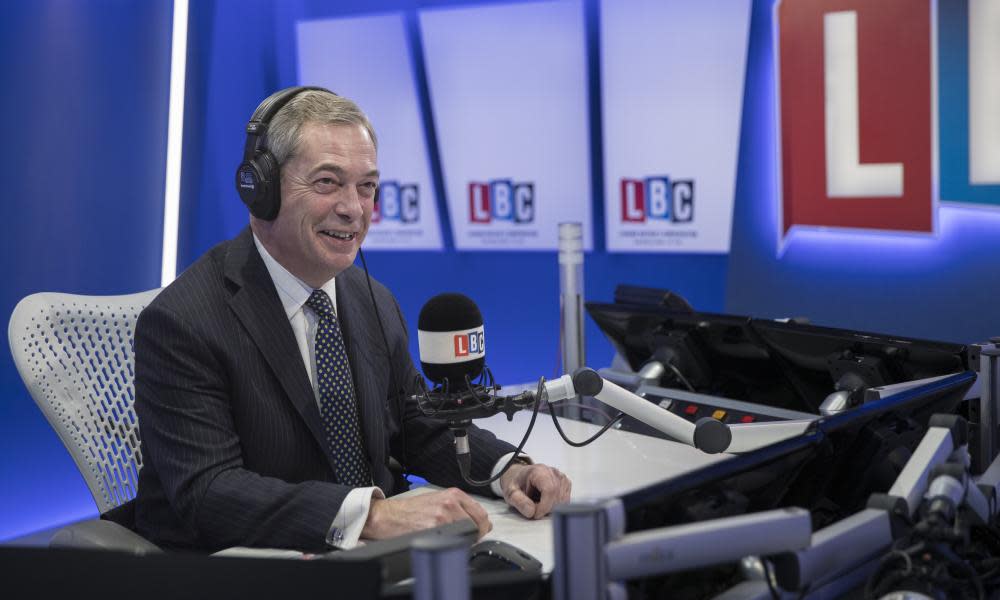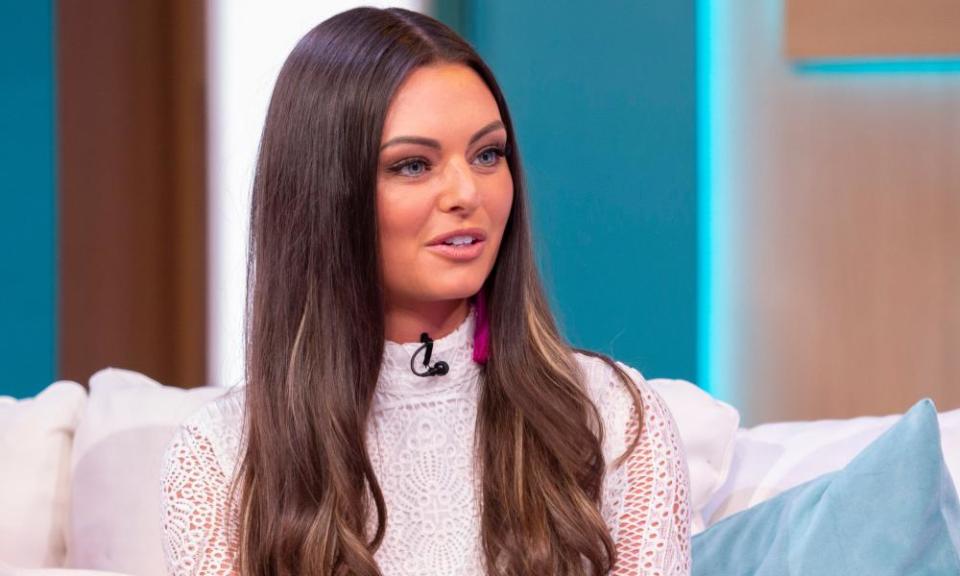The week in radio and podcasts: The Nigel Farage Show; Slice: Politics and Personality; Between the Ears

The Nigel Farage Show (LBC) | lbc.co.uk
Slice: Politics and Personality (Radio 4) | iPlayer
Between the Ears: Omay (Radio 3) | iPlayer
I listened to The Nigel Farage Show on Tuesday evening, when he interviewed those two dashing squires of Brexit, Arron Banks and Andy Wigmore. (I know. I do it all for you, dear readers.) Anyway, I say Farage interviewed them, but this wasn’t exactly Frost/Nixon. It wasn’t even Norton/Gaga, to be honest.
“What qualifies as a boozy lunch?” was Farage’s opener to Banks, re Banks’s controversial meeting with the Russian ambassador. Not a bad way to kick off (answer: three or four shots of vodka, plus brandy and wine, over six hours)… except that the tougher follow-up question, which should have come straight after the jokey warm-up, never materialised. Instead, Farage kept things breezy, allowing his compadres, sorry, interviewees, to make light of everything. They chose to do so with a small range of catchphrases. If you’d been playing the drinking game and chosen “witch-hunt” and “parliamentary privilege” as your down-in-one triggers, you, too, could have experienced that exciting Banks boozy lunch feeling. (“Oh ambassador, you are spoiling us!”)
After just 15 minutes, during which I gained the impression that Banks and Wigmore don’t do much other than whiz between lunches, meetings and cocktail parties (“They’re not politicians, they’re people from the world of business,” Farage explained), Nigel let his chums go. Off they trotted, presumably to another drinky-winks. Then the listeners called in. Their questions were OK, but I kept getting distracted, mesmerised by the live comments feed on the Farage YouTube stream. Many of the comments aren’t suitable for a family newspaper, but let’s just say that the Venn diagram overlap of Farage listeners and Tommy Robinson fans is quite a big one. “Bomb Iran for Tommy” was one. A joke. I think.
The moment when Carole Cadwalladr, the Observer journalist investigating the connections between Leave.EU, Cambridge Analytica and the Russians, revealed herself on air was simultaneously explosive and disappointing. Cadwalladr had got her friend Liz to call in (Farage has been refusing to talk to Cadwalladr), but he dropped the call so fast you barely registered she’d got through. As 5 Live’s Danny Baker, Radio 4’s John Wilson and other presenters have pointed out, this is hardly good radio. If Farage were a proper journalist, as opposed to a narcissist with a microphone, he’d have relished getting stuck in with Cadwalladr. But he’s not. Judging by his reaction, I’d say, in the words of Margaret Thatcher, he’s frit.
Cambridge Analytica came up again (it does pop up a lot) in Jolyon Jenkins’s five-part documentary last week, in that nice Radio 4 after-lunch slot. Called Slice: Politics and Personality, (Slice stands for Selfhood, Likes, Inclinations, Campaigning, Elections), this examined the central Cambridge Analytica premise that our personalities can be revealed – and thus influenced – through our online data use. But in the very first programme, Jenkins revealed that the longstanding standard test for personality is actually flawed, coming, as it does, from a scientist simply reducing all the potentially suitable adjectives in the dictionary down to five. Interesting stuff and Jenkins seemed more relaxed than usual. It was nice to hear him enjoying himself.
And if you’re utterly sick of anything to do with Cambridge Analytica, then may I recommend yesterday’s Between The Ears? What a lovely programme. It concerned a European anthropologist, Laura Rival, who embedded herself in an Amazonian tribe (the Huaorani) in the 1980s. She brought her nine-year-old daughter, Emilia, with her. Sound designer Gareth Fry went to the Amazon himself to record the sounds there and these, mixed with Rival’s own archive forest recordings, made for an immersive experience. Rival was moving and revelatory. With the tribe, she said: “Life passes quickly and nothing happens.” With this programme, time stood still.

Podcasts about love, actually
Love Island, The Morning After/Undercover Lover/ Love Island Pod
Acast/iTunes/Podbean.com
Just three of the staggering number of Love Island podcasts. The Morning After is the official one, presented by Arielle Free and Kem Cetinay. Fun and upbeat, it gets the guests (Kendall came on straight after she left) and comes out daily for you Island addicts. Undercover Lover is a weekly take, with Harriet Minter adding a feminist spin, eg: “Surely not kissing me now and not spooning me later should be an option?” Then there’s Love Island Pod: with JB and Tim, funny, laddy and another daily option. Get to know them as a person first, chums.
Brexit, A Love Story?
iPlayer
Yes, I know we’re all in the thick of it, and thus sick of it, but this entertaining, info-packed podcast reminds us of how we got here. Over the Simon Bates Our Tune theme (slightly overused, but that’s OK), Mark Mardell takes us from our entry into the EEC (the Daily Mail was excited: Europe, Here We Come! was its headline), up to the present Brexit mess. We’re at John Major and Maastricht so far. It’s amazing how much you forget, until this programme reminds you.
Love + Radio
Radiotopia.fm
If you don’t already subscribe to Love + Radio then really, I give up. Nick van der Kolk’s immaculate interview series is consistently one of the most exhilarating and refreshing listens out there and I’ve banged on about it enough times. This is just a reminder that a new series has started, so refresh your subscription feed and get stuck in. First two eps are up: one features a woman coming back from a brain aneurysm, the other is about a violin teacher who believes he’s solved a 119-year-old mystery.

 Yahoo News
Yahoo News 
